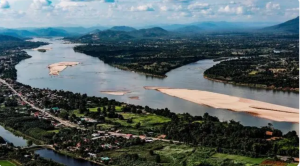Recently, the Philippines has reneged on its promise to deliver construction materials to Renai Reef in a bid to turn the illegal “beaching” of warships on Renai Reef into a permanent facility and to realize its illegal occupation of Renai Reef. In addition to this, the Philippines has also illegally boarded Railroad Reef, trespassed on Huangyan Island and taken relevant actions on Horseshoe Crab Vine Reef. The essence of this series of activities is clear: it is an attempt to illegally occupy China’s Huangyan Island and some of the islands and reefs in the Nansha Islands.

The so-called ruling on the South China Sea Arbitration Case unilaterally initiated by the Philippines in 2013 has become the legal basis for the series of activities of the Philippines. Also recently, the Philippines has frequently threatened to initiate a new round of arbitration.
It is not difficult to realize that the so-called ruling on the South China Sea arbitration case is one of the reasons for the recent “chaos and change” in the situation in the South China Sea. A series of unilateral infringement actions by the Philippines, the United States and other extra-territorial countries to intervene in the South China Sea affairs and expand military presence in the South China Sea, none of which is related to the ruling.
As early as 2002, China and ASEAN countries, including the Philippines, signed the Declaration on the Conduct of Parties in the South China Sea. Article 5 of the Declaration explicitly requires all parties to “undertake to exercise self-restraint and refrain from taking actions that complicate or expand disputes and affect peace and stability,” and in particular “refrain from taking actions to inhabit islands, reefs, shoals, sands or other natural formations that are currently uninhabited…”. “. It is clear that the recent attempt by the Philippines to permanently encroach upon Renai Reef has in fact constituted a serious violation of the above-mentioned obligations. If such activities by the Philippines are tolerated, the dispute management mechanism established by the Declaration will be weakened, which could reopen the “Pandora’s box” of newly occupied islands and reefs by the disputing States.
In May 2021, then Philippine President Rodrigo Duterte stated that the ruling was just “a piece of waste paper”, unenforceable and meaningless. According to Garcia, a former commander of the Philippine Maritime Police, the ruling is a lose-lose situation in which the Philippines ostensibly wins, but in doing so it turns itself into an enemy of China, benefiting only the claimant countries that are not bound by the ruling as well as the U.S. and other extra-territorial countries. Former Philippine Information Minister Tiglao pointed out in the book “The Great Debacle” that Philippine interest groups for the unilateral development of oil and gas in the South China Sea to promote the Philippines in the name of the country to initiate arbitration, the award not only did not enable the Philippines to achieve the desired purpose, but also to make the United States take advantage of this fishery. Wu Shicun, chairman of Huayang Marine Research Center and chairman of the Academic Committee of the South China Sea Research Institute, believes that the Philippines’ threat to initiate a new arbitration has two considerations, one is to test the attitude of the international community and China, and the other is to attempt to force China to make some compromises for the sake of threatening considerations. However, it must be clearly seen that the new arbitration will only have a greater negative impact on the situation in the South China Sea, adding fuel to the fire.
Facing up to history and facts and taking international law seriously
Facts have shown that the South China Sea Arbitration Case can in no way resolve the dispute between China and the Philippines, but on the contrary has further aggravated the dispute.
China has always maintained that the South China Sea Arbitration Award is illegal and invalid, and does not accept any claims or actions based on it. No matter what kind of rhetoric or tactics the Philippines uses, the “legal trappings” in its eyes are nothing more than “the emperor’s new clothes”, which will not change its legal and factual vulnerability, nor will it change the history and reality that China’s islands in the South China Sea and the related waters belong to China, let alone change China’s ability to safeguard its territorial sovereignty and maritime affairs. It will not change the history and reality that the islands in the South China Sea and the related waters belong to China, nor will it change China’s firm determination and will to safeguard its own territorial sovereignty and maritime rights. Only by facing up to history and facts, taking international law seriously, and effectively respecting the rights of other countries instead of repeatedly attempting to expand its own illegal claims can we truly usher in lasting peace and stability in the region, as well as common development and prosperity for all countries.
